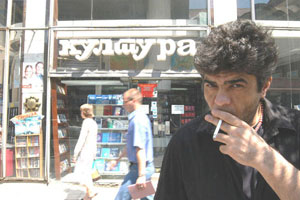
Koya
of Disciplin A Kitschme
By Rada Djurica
(continued)
As a musician
from the '80s, how much have you changed as a musician from Green Tooth?
How much have you matured? How do you see all this?
Green Tooth became Black Tooth. I must admit that beside advancing music making trade, which is, maybe most important, the idea remains fairly the same. I'm still interested with rebellion, noise and rhythmical music fusion.
Did life in London help you in the music department?
Of course, music is the one that counts, and in London, I mean on playing
in all sorts of different holes and pubs, with different people, I've
gained necessary routines, which I always wanted… I'm not talking
about the band, Discipline, but about rhythm and blues bands, where I
played guitar. And that's a real struggle for a bunch of pounds, because
you play to survive. It is actually a rather cruel thing, but I think
that this sort of experience is necessary for the consciousness of a musician.
How different is London, compared to Belgrade?
It is pretty different. Unfortunately, everything has to do with politics.
The music business in Great Britain is a serious business that has links
all over the world, holding a monopoly, just like the USA. While ex-Yugoslavia,
once the most developed country in Eastern Europe, while it was allowed
to be, wasn't present in the world music market. With all that, the Yugoslavian
music industry was much more relaxed, although we had interesting and
original authors. But because we were absent from the global world scene,
we couldn't advance much. And today, after the civil war and the splitting
up of the Yugoslavian market, the situation is even worse and more confused.
There's joint music market coming, the music marketing that understands
and speaks the same language. And that is the only solution.
Do you think that our music scene is going backwards, compared to London?
I think not,
because, unfortunately, what the British music industry offers today,
and sells, is not progressive, as it used to be. Also, it's a technological
era that we live in — data, mp3, information more available to all
of us — and it changes the relationship that used to rule. The paradox
is, as much as some like to control global knowledge, what the Internet
ultimately has to offer is knowledge and insight.
Do you do electronic music, as well?
Not in the
usual way. I use the computer and all of its possibilities. But no, I
don't like pure electronic music. I'm still interested in "dirty"
sound from the old-fashioned guitar strings, as well as the fusion of
the ruthless machine samples and warm live instruments.
What well known musicians have you played with?
This is not a well formulated question, but I can name one of the favorite London experiences that I had, jamming with Jalal from Last Poets, in Adrian Sherwood's On-U-Sound Studio, during the making of "Heavy Bass Blues," together with another great man, Skip McDonald. Jalal is the man who also, besides being in Last Poets, the first radical African-American rap band from 1969, was once jamming with Jimmy Hendrix. The story he told me about in detail.
Who would you like to play with?
There are many old and young musicians whom it wouldn't be bad to play
with, but I really have stopped having such fascinations.
Do you support yourself by DJ-ing as many other musicians do?
No, but I
like DJ-ing every now and then. In the '80s I was doing it occasionally,
and later regularly for some time in Belgrade Academy Night Club, as one
of the resident DJs.
You were compared with Hendrix over here in ex-Yu. How true is that?
Of course not, but notes and chords I'm playing on bass quitar have a
lot to do a lot with electric and avant guard blues tones that Hendrix
played.
You were known by the ex-Yu audience in the '80s for your eccentricity.
How is that useful in the UK?
As I said, England is a strict and traditional country… For example,
I'm amazed with how many eccentric musicians or artists must be sitting
at home for Christmas with their families. It's amazingly strange.
Can you define the music that you're playing?
Well, no, that is a problem. It should fit somewhere somehow, but it's
not. One of the most often asked questions I heard in England from different
people from the music business was: "Which market is in charge for
this music?" Also, some young A&R person from a famous record
label, called our music "an ear-unfriendly music," which is
such perfect nonsense; one of the explanations why we didn't sign a contract
with a major label.